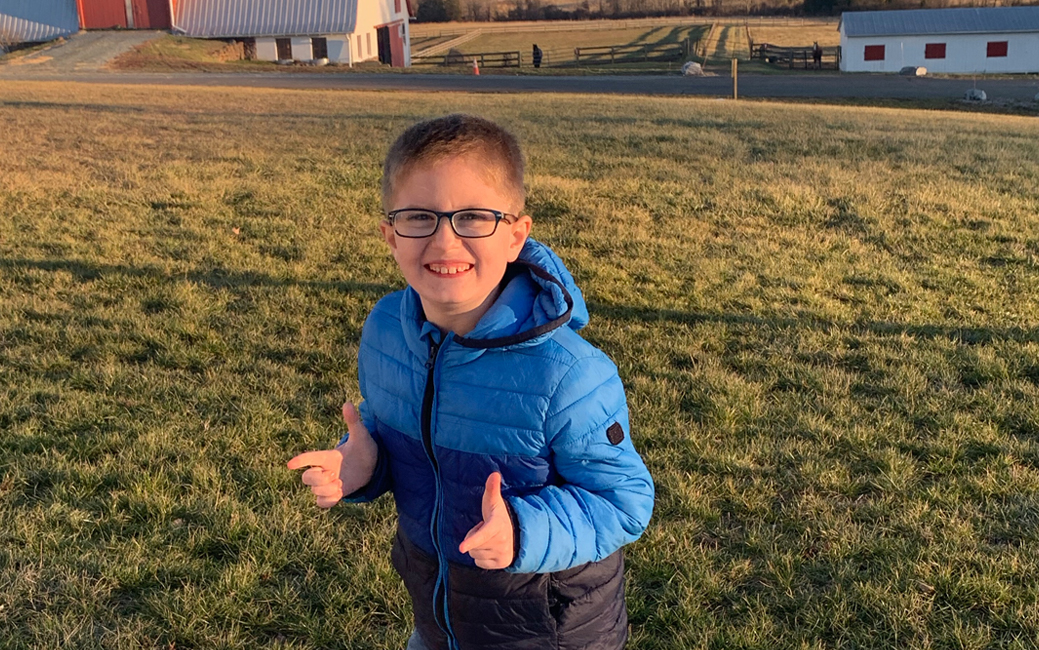Different, Not Deficient
BY ADRIENNE FRANK

“I have something important to tell you,” my 7-year-old son, Owen (pictured above), said one evening last fall as we drove home from school. “There are two kinds of people in the world: R’s and F’s. I’m an R, but I want to be an F.”
His choice of letters was significant. F is Owen’s favorite letter—a nod to the love of firetrucks he’s nurtured since toddlerhood. Like any one of us, he’s keenly aware of what he’s not. But instead of longing to be thinner or richer, Owen simply wants not to be different.
My beautiful boy has a complicated cocktail of diagnoses: autism, ADHD, dyslexia, dyscalculia and executive function disorder. He can be particular, rigid, anxious and singularly focused on penguins or subways, of which he possesses an encyclopedic knowledge. He can explode with anger or flap with joy. Inquisitive and creative, Owen boasts a triple letter score vocabulary and asks thoughtful, often unanswerable questions—“Why don’t chickens have eyebrows?”—yet he has little sense of time or personal space. Owen is sensitive to loud noises and chaotic environments, and often prefers to draw by himself in blissful silence.
My husband, Sam, and I had been debating when we should tell Owen that he’s on the spectrum, but it never seemed the right time. Until it was.
After a January reporting trip to the Hussman Center, I was talking to Sam about the story when Owen—listening stealthily while tapping furiously on his iPad—chimed in: “Mama, do I have autism?”
The question that I’ve been bracing myself for since my only child was diagnosed in 2015 lingered for what felt like an eternity. My eyes met Sam’s and he gave me a gentle nod.
“Yes,” I said. “You have autism.”
I did my best to explain what that meant, but it was impossible to avoid the word that he’d already begun to associate with being deficient, odd, less than. “Your brain is just wired differently.”
Owen didn’t say a peep about it for a month, until I told him that, due to a childcare snafu, he had to go with me back to the Hussman Center for the Friday evening social group. “It’s an autism club?” he asked cautiously but curiously as we sat in traffic.
“Yep,” I replied. “Isn’t that cool?”
And it was.
I’ve long suspected that autistic people have a sixth sense when it comes to spotting others on the spectrum. So it was no surprise when one friendly young man after another—Sam, Chris, Daniel, Robert—approached us during the social group to chat with my son.
How old are you, little man? What’s your favorite Lego movie? Do you play Minecraft? Do you like SpongeBob?
Seven; the first one; yes; and oh, yes, he said, smiling. Soon, Owen was telling them about school and his cats, Finn and Cinnamon. “It was nice talking to you,” he chirped, giving them five as we moved from one room to the next. I could see the wheels spinning in his head: If this is what autism—what being different—looks like, it might be OK.
Two hours later, we were preparing to leave when we bumped into 25-year-old Christopher Garrett. After entertaining my questions, he shifted his focus to Owen, who revealed that some of his classmates pick on him.
“Buddy, being different is your superpower,” said Christopher, as Owen lit up and I teared up.
Too often, we focus on the challenges associated with autism: social isolation, bullying, anxiety and depression, unemployment, learning disabilities and comorbid conditions. And make no mistake, those struggles are very real for people on the spectrum and those who love them.
But we mustn’t forget autism’s silver lining: how, through shared experience and a shared love of SpongeBob SquarePants, those on the spectrum can form an affirming, inclusive community where being different isn’t the thing that sets people apart—it’s the very thing that brings them together.
On the drive home, I asked Owen if he thought Christopher and the others were
R’s or F’s.
“Oh, Mama, at the autism club, we’re all F’s.”
Adrienne Frank is a writer and editor in Bethesda, Maryland.
